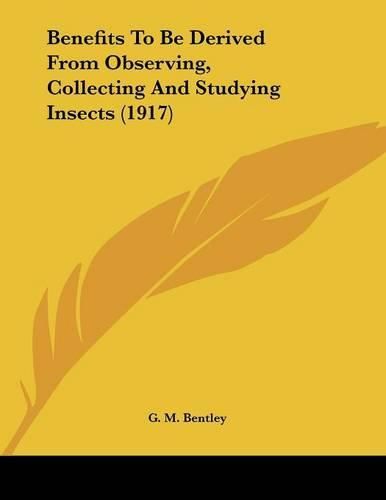Readings Newsletter
Become a Readings Member to make your shopping experience even easier.
Sign in or sign up for free!
You’re not far away from qualifying for FREE standard shipping within Australia
You’ve qualified for FREE standard shipping within Australia
The cart is loading…






Benefits To Be Derived From Observing, Collecting And Studying Insects is a book written by G. M. Bentley in 1917. The book is a comprehensive guide to the study of insects, and it explores the various ways in which insects can be observed, collected, and studied. The author emphasizes the importance of insects in the natural world and highlights the benefits that can be derived from a better understanding of these fascinating creatures.The book covers a wide range of topics related to insect biology, including anatomy, behavior, and ecology. It also provides practical advice on how to collect and preserve insects for study, as well as tips on how to observe insects in their natural habitats. The author includes numerous illustrations and photographs to help readers identify different species of insects and understand their unique characteristics.Throughout the book, the author stresses the importance of studying insects for both scientific and practical purposes. He notes that insects play a crucial role in pollination, pest control, and other ecological processes, and that a better understanding of these processes can help us to better manage our natural resources. The book also includes a section on the economic importance of insects, highlighting their role in agriculture and other industries.Overall, Benefits To Be Derived From Observing, Collecting And Studying Insects is a valuable resource for anyone interested in the study of insects. It provides a wealth of information on insect biology and ecology, as well as practical advice on how to collect and study insects. The book is written in an accessible style and is suitable for both amateur and professional entomologists alike.This scarce antiquarian book is a facsimile reprint of the old original and may contain some imperfections such as library marks and notations. Because we believe this work is culturally important, we have made it available as part of our commitment for protecting, preserving, and promoting the world's literature in affordable, high quality, modern editions, that are true to their original work.
$9.00 standard shipping within Australia
FREE standard shipping within Australia for orders over $100.00
Express & International shipping calculated at checkout
Benefits To Be Derived From Observing, Collecting And Studying Insects is a book written by G. M. Bentley in 1917. The book is a comprehensive guide to the study of insects, and it explores the various ways in which insects can be observed, collected, and studied. The author emphasizes the importance of insects in the natural world and highlights the benefits that can be derived from a better understanding of these fascinating creatures.The book covers a wide range of topics related to insect biology, including anatomy, behavior, and ecology. It also provides practical advice on how to collect and preserve insects for study, as well as tips on how to observe insects in their natural habitats. The author includes numerous illustrations and photographs to help readers identify different species of insects and understand their unique characteristics.Throughout the book, the author stresses the importance of studying insects for both scientific and practical purposes. He notes that insects play a crucial role in pollination, pest control, and other ecological processes, and that a better understanding of these processes can help us to better manage our natural resources. The book also includes a section on the economic importance of insects, highlighting their role in agriculture and other industries.Overall, Benefits To Be Derived From Observing, Collecting And Studying Insects is a valuable resource for anyone interested in the study of insects. It provides a wealth of information on insect biology and ecology, as well as practical advice on how to collect and study insects. The book is written in an accessible style and is suitable for both amateur and professional entomologists alike.This scarce antiquarian book is a facsimile reprint of the old original and may contain some imperfections such as library marks and notations. Because we believe this work is culturally important, we have made it available as part of our commitment for protecting, preserving, and promoting the world's literature in affordable, high quality, modern editions, that are true to their original work.